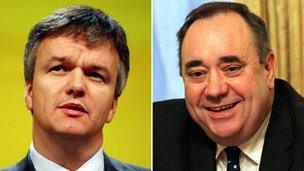Minister Moore 'happy to sort out' legal referendum
- Published
- comments

Michael Moore says he wants to work with Alex Salmond
UK minister Michael Moore has said he would be happy to work with Scotland's first minister to "sort out" legal issues over an independence referendum.
The Westminster government had insisted that Holyrood could not go ahead with the poll without its authority.
But Alex Salmond said his SNP administration had the right to hold the referendum in the autumn of 2014.
If Westminster and Holyrood fail to resolve the legal issue it could end up being ruled over by the Supreme Court.
Mr Moore insisted that "we get on with" the referendum which he said was the "most important decision any of us in Scotland will take in our lives".
During Scottish Questions in the House of Commons, the Lib Dem coalition minister told MPs that the referendum would be "made in Scotland and for the people of Scotland".
A unified tone on the issue was sounded during Prime Minister's Questions when David Cameron said he "100% agreed" with Labour leader Ed Miliband that the UK was "stronger together and weaker apart".
The PM said he was a passionate believer in the union, adding that he was "sad that we are even having this debate".
However, Mr Cameron acknowledged that the SNP's May 2011 election victory gave it the right to hold a referendum.
On Tuesday the MP for Berwickshire, Roxburgh and Selkirk delivered a statement on the Scottish referendum and confirmed a UK government consultation would take place, external.
The SNP government has also announced that it would hold its own consultation on the Scottish independence vote.
In addition, it revealed it wanted the referendum to be held in autumn 2014.
But it has been argued that in order for it to be binding, the UK government needs to provide the Scottish government with the legal authority.
Westminster's "clear view" was that the power to hold a referendum was "reserved" to Westminster under devolution laws passed in 1998 and that the Scottish government could not authorise a referendum on its own.
Mr Moore told BBC Scotland's Good Morning Scotland programme: "I think the important point is that we would not want to carry out the whole referendum process, make the decision in the ballot box and then discover somebody somewhere wanted to challenge that."
'Get out clause'
Asked who might want to make a legal challenge, he said: "I don't know, but isn't it better to resolve that potential, get rid of any risk which I think is clear cut risk, let's get on with it.
"I am happy to work with Alex to sort out the legal issue and then let's have a debate about whether or not Scotland should be part of the UK or not - that is the crux of this matter."
But Mr Salmond said UK PM David Cameron had "no mandate" to set the rules and suggested he was doing so because he was "frightened" he would lose.
The SNP leader believed the 2014 date would allow people to make a "considered" decision on the country's future within the UK.
He told BBC Radio 4's Today programme it was "not fair" to suggest he was worried he would lose if the referendum had only two options - to stay in the UK or leave it - which is the UK government's preference.
He denied wanting a "get out clause" and said there was a "lot of opinion in Scotland" supporting a third option - increased financial powers for the Scottish government, short of full independence, known as "devo max".
Mr Salmond said: "I just don't think it's right and proper at this stage, before people have had a consultation on the referendum question or questions for the UK government to start ruling that out.
"Why should we be excluding what is a legitimate point of view across Scotland?
"Perhaps the Westminster politicians are trying to set the ground rules, the timing, who votes, the questions because they are frightened they will lose it?"
Alex Salmond: Referendum must be "made in Scotland and decided by the Scottish people"
Mr Salmond went on to accuse the UK government of adopting a belligerent attitude.
He said Mr Cameron's intervention had been "almost Thatcher-esque". He added: "The idea [was] that 'London knows best' and was really operating in our best interests but wanted to set the ground rules for our referendum, despite the fact he's got no mandate whatsoever for doing so.
"The SNP won an overwhelming majority on the promise that we would offer the people a referendum on their own future, is it not entirely reasonable that that referendum ... is made in Scotland and decided by the Scottish people?"
Big differences
Scottish Labour leader Johann Lamont said Mr Salmond's announcing the preferred date was a "panicked response from a panicked first minister".
Ruth Davidson, leader of the Scottish Conservatives, said the "key issues" were what the referendum question would be and who would oversee the vote.
Under the Scottish government's timetable, a referendum bill would be introduced at Holyrood in January 2013, it would be expected to be passed by the autumn and gain Royal Assent later in 2013.
Big differences also remain between the Scottish and UK governments on the timing of the referendum, who would run it and on whether 16 and 17-year-olds could vote.